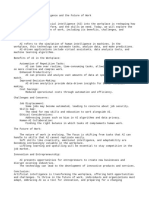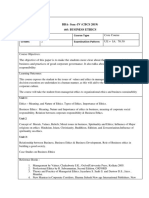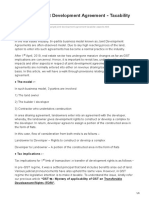0% found this document useful (0 votes)
17 views2 pagesAI and The Future of Work
The rise of AI is transforming the workforce, creating both opportunities and challenges as automation may replace some jobs while generating new roles focused on AI oversight and collaboration. Success in this new landscape will require adaptability and skills such as digital fluency and ethical reasoning, emphasizing the importance of lifelong learning. Ultimately, the future of work will involve a partnership between AI and humans, where human judgment and creativity remain essential.
Uploaded by
manifestationworksmanCopyright
© © All Rights Reserved
We take content rights seriously. If you suspect this is your content, claim it here.
Available Formats
Download as DOCX, PDF, TXT or read online on Scribd
0% found this document useful (0 votes)
17 views2 pagesAI and The Future of Work
The rise of AI is transforming the workforce, creating both opportunities and challenges as automation may replace some jobs while generating new roles focused on AI oversight and collaboration. Success in this new landscape will require adaptability and skills such as digital fluency and ethical reasoning, emphasizing the importance of lifelong learning. Ultimately, the future of work will involve a partnership between AI and humans, where human judgment and creativity remain essential.
Uploaded by
manifestationworksmanCopyright
© © All Rights Reserved
We take content rights seriously. If you suspect this is your content, claim it here.
Available Formats
Download as DOCX, PDF, TXT or read online on Scribd
/ 2

















































































